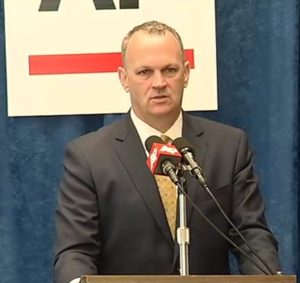
Florida House Speaker Richard Corcoran addresses reporters during a media briefing ahead of the Spring legislative session.
Florida's High-poverty urban areas shouldn't have to rely on wealthy backers to attract top charter schools, the state's House speaker told reporters this morning.
If the state wants more charters with national reputations for serving low-income students, he said, policies will need to change.
Speaking at an annual media briefing hosted by the Associated Press, Rep. Richard Corcoran, R-Land O' Lakes, lamented the fact that Florida has a lone collection of KIPP schools in Jacksonville and a single public charter boarding school — SEED Miami.
Both institutions receive annual line-item appropriations from the Legislature. The funding is intended to cover the cost of the extra instructional time needed to help low-income students catch up academically. But that funding doesn't cover all of their costs.
"The only reason those two schools exist right now in the state of Florida is because of the generosity and benevolence of millionaires and billionaires in their communities, and that's unacceptable," Corcoran said.
State education officials for years have pushed to bring more nationally recognized charters to high-need, low-income areas. They've put together grant programs and sought federal funding to support those efforts. They've also sought legislative changes that have yet to become law.
Corcoran has previously talked about funding changes that would support the likes of KIPP and SEED on a larger scale.
This morning, he said the House intends to overcome "special-interest bias" and "figure out a way to afford those children a world-class education."
"We will, and we will pay for it," Corcoran said. "And we will get those results."